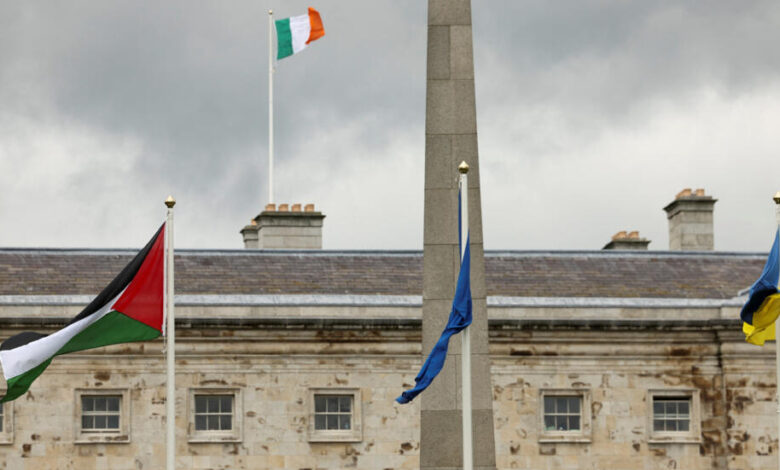
By Katherine Butler, The Guardian.
Politicians capable of international leadership on Gaza can also defeat the dishonesty that says Ireland is full
The poet Patrick Kavanagh was inspired to write sonnets about the “leafy-with-love” banks of the Grand Canal near Baggot Street bridge in south-central Dublin. There was not much poetry or love on the same stretch of the canal the other day, as rain whipped a row of brightly coloured tents neatly lining the towpath, side by side.
The occupants I met were mostly keeping hidden from the rain and, perhaps, from those who kick the tents and attack volunteer helpers, or the self-styled “patriots” who travel the country burning down designated refugee accommodation sites, chanting that Ireland is full.
But Nabil, who arrived in Ireland on 8 May, told me about his journey from the Gaza Strip, through the Rafah border crossing with Egypt, reaching Ireland via “Italia”. Despite the pitiful and precarious conditions, he was relieved to be in the country, he said, and hoped his family – including a newborn – would eventually be able to join him. He made a cradling gesture as he said the word “baby”.
If Nabil had heard about Ireland’s advocacy for Palestinian rights, he might be puzzled by his current plight. As of 28 May, Ireland officially recognises that the Palestinian state exists. Nabil is no longer stateless in the eyes of Ireland – he is just homeless on the streets of its capital.
Ireland’s recognition of Palestine is applauded by millions of people around the world. Younger generations in particular feel immense pride at the willingness of a small country to go out on a limb, to take a historic step that the taoiseach Simon Harris told the Dáil on Tuesday, is “the right thing to do”.
Micheál Martin, the foreign minster, told the Guardian in March that empathy was a factor driving Ireland’s outspokenness on the slaughter and starvation in Gaza. “We’ve experienced famine, we know what it’s like in our psyche,” he said.
Martin is right that Ireland’s national trauma should give its people a particular antenna for injustice. Few families were not touched by mass starvation, displacement or dispossession. My ancestor Rose died at the age of 20 on a “coffin ship” crossing the Atlantic to reach the US in the spring of 1850, when famine had claimed nearly one million lives. I see little difference between her resolve and that of Nabil, and the many others who risk their lives every day to reach Europe.
But if our history can inspire a bold and principled foreign policy, why at home is the state telling a vulnerable Palestinian that the best Ireland can do for him is a pop-up tent and a sleeping bag?
About 1,800 people seeking asylum are homeless in Ireland. Mini-encampments began to mushroom in Dublin after the distressing forcible dismantling by the authorities of a bigger “tent city” on 1 May. The tents keep sprouting because Ireland’s asylum system is broken, and a panicked government, having failed to find spaces for asylum seekers or make them less visible ahead of local and European elections on 7 June, wants to be seen to be putting a “full” sign on the door.
They have become symbolic of immigration as an issue that is dominating an Irish election campaign – for the first time. The toxic context is months of small but persistent protests, clashes and arson attacks on vacant buildings designated for refugee accommodation. No charges have been brought, but online conspiracists, racists and ultra-nationalists, some of whom found an anti-vaxxer, anti-lockdown platform in the pandemic, have openly encouraged anti-refugee hatred.
In December, the government announced that it could no longer provide beds for asylum seekers – only tents. The timing, only weeks after riots in Dublin in which far-right agitators tried to whip up violence against foreigners by circulating a false rumour that an asylum seeker was responsible for a stabbing, was not a coincidence.
Claims and counterclaims about the “Rwanda effect” of UK policy have added a new layer of panic. Is the UK pushing its unwanted asylum seekers to Ireland via Northern Ireland? Gardaí have been stopping and searching buses travelling from Belfast to Dublin.
Either way, tents in the streets are welcome visual evidence for international conspiracists that Europe is swamped by “refugee camps”. To many Irish voters, they signify chaos and failed policy, but also a sense that immigration in all its forms is “out of control”.
And so Ireland, which has never elected a far-right politician, and whose government is showing commendable moral leadership over Palestine, risks heading down the same perilous rightward lurch on immigration as much of the rest of Europe.
Not all of this was inevitable. True, immigration is a very recent Irish phenomenon. Before the mid-1990s, and then an influx of labour from eastern Europe after 2004 that framed the “Celtic Tiger” boom years, the idea of anyone coming to Ireland for work or refuge would have seemed ridiculous.
Refugee numbers have risen sharply since 2022, even if Ireland is not by any stretch the most burdened EU state. In 2013, there were 940 first-time asylum applicants to Ireland. Between 2022 and the end of 2023, there were more than 26,000.So far this year, more Palestinians have applied for protection from Ireland than for the whole of 2023.
The suddenness of the transition from a country that was almost entirely monocultural and white to one in which 20% of the population was born abroad created an obvious space for pushback. Yet, in the 2020 general election, only 1% of people said immigration was an important factor in how they voted. Ireland took in about 100,000 Ukrainians after the 2022 Russian invasion – to zero public outcry. Until late 2023, immigration registered as a concern for only about 5% of respondents in an Irish Times survey.
At least some of the tolerance was the result of planning. I know this because about 3,000 refugees from nearly 30 countries were resettled in small rural places (including my home town) between 2000 and 2019, and a further 2,100 Syrians arrived from UN camps in Lebanon and Jordan between 2015 and 2021, with minimal fuss.
Language and other professional supports were provided. Schools and sports clubs were liaised with, and were happy to have new pupils and players in their midst. A councillor in another part of the region proudly told the local paper in 2023 that most of the Syrians who had arrived a few years earlier had become part of the community. “It’s good for your heart to see it,” he said.
The place where I grew up, and where my family has lived (and emigrated from) for generations, has a population of less than 8,000. Almost imperceptibly, it has gone from homogeneity to multi-ethnicity in 20 years. Syrian families have settled in alongside eastern Europeans. The small Muslim community has a prayer centre a few streets away from the church. Modular housing for 200 Ukrainian refugees opened in July 2023, barely noticed. No doubt racism shows its face occasionally, but immigration has been a non-issue. And this in itself is a remarkable achievement.
Or it was. Now, in a climate of disinformation and hardened mainstream political rhetoric, 63% of voters in Ireland clamour for a tougher asylum policy and more than a third say immigration is a negative thing. A modular homes project like the one that raised no eyebrows a year ago, has drawn violent protests in another town in the region.
A structural housing and rent crisis is often cited as a source of justified anger across Ireland. But refugees are not competing with people trying to get on the housing ladder. It is far-right and anti-immigrant voices who conflate the two issues, to foster a dishonest narrative in which foreigners are jumping the queue. Deliberately or not, the government’s hard talk seems to confirm the connection: you can’t get a house? Don’t worry, no foreigner will get anything better than a tent.
A dehumanising and shambolic refugee system – the current backlog of unprocessed cases is 21,000 people – could have been fixed.
When I was back visiting family this month, it was disturbing to see canvassers for far-right candidates handing out their incoherent and hate-filled flyers for the European elections.
But it’s been even worse to hear elected politicians on local radio, dog-whistling thinly disguised nativism as concern about the safety of local communities. Most people in small towns will not have had a negative encounter with a refugee, but once the public discourse is contaminated it is hard to detoxify.
When trouble flared at a protest against an asylum centre in County Wicklow recently, most of the social media posts egging on the “patriots” were generated in the US, UK and Canada. This suggests that support for hi-vis vest-wearing troublemakers is still fringe. But letting them set the discourse is playing with fire.
Anti-immigration candidates are standing in each of Ireland’s three European parliament constituencies. They may not gain an electoral foothold this time, but the anti-immigrant vote will almost certainly build if the political class nods along with their arguments. A general election must be held by March 2025. And as Ireland’s neighbours elsewhere in Europe have discovered, when mainstream politicians make elections about far-right issues, voters don’t vote mainstream – they vote far right.
In our old world, the national story was simpler: stagnation, unemployment, emigration. Now, having dwindled for a century, the population has, for the first time since the famine, recovered to exceed 5 million people and is growing.
This is good news. The Irish government is running a country which has full employment. It has enough wealth to fix its multiple housing issues and support those communities that are hosting refugees.
It is not too late to challenge the baleful myths of the far right. And just as they have dared to do on Palestine, Ireland’s leaders must pull public opinion with them behind a confident and hopeful narrative for a progressive, inclusive country that knows “the right thing to do”. If Ireland can inspire others with its political and moral leadership in the world, it can do the same at home.





